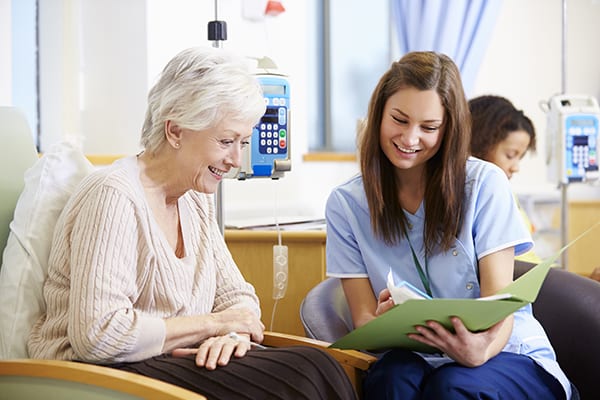Patient and Family Advocacy
Who are Cancer Genetic Counselors?

Cancer genetic counselors are board-certified healthcare professionals who specialize in educating and counseling individuals and families about hereditary cancer conditions. Cancer genetic counselors are able to identify individuals at risk for a variety of hereditary conditions, coordinate genetic testing, interpret test results, and support individuals and families as they help them to make informed choices about their health.
Why See a Cancer Genetic Counselor?
Cancer genetic counselors have special expertise in cancer genetics and hereditary cancer syndromes. Meeting with a cancer genetic counselor may be recommended for individuals who have:
- A personal and/or family history of cancer diagnosed under age 50
- Multiple generations of cancer in their family
- A personal and/or family history of multiple primary cancers
- A personal and/or family history of rare cancers (i.e. ovarian cancer, male breast cancer, medullary thyroid cancer)
- Three or more family members with the same type of cancer or related cancers, like breast and ovarian cancer or colon and uterine cancer
- A personal history of cancer and is a member of an ethnic group at a higher risk for inherited gene mutations (i.e. Ashkenazi Jewish background)
- A known genetic mutation in their family
- A medical history that is linked to hereditary cancer risk (i.e. many colon polyps)
What to Expect During a Cancer Genetic Counseling Appointment

During a typical genetic counseling appointment, the cancer genetic counselor will:
- Obtain the patient’s medical and family history, with special attention to cancer history
- Provide a risk assessment to determine if genetic testing is appropriate for the patient
- Educate the patient about the benefits and limitations of genetic testing
- Discuss the possible implications of the genetic testing results, for both the patient and his or her family
- Address the patient’s concerns and questions, including questions about insurance coverage and laws that protect against genetic discrimination
- Support the patient as they make a decision about pursuing genetic testing
- Collect the patient’s DNA sample (usually through blood or saliva), if testing is appropriate for the patient
- Identify additional resources for the patient, if needed
If genetic testing is indicated for the patient, genetic counselors will provide both pre-test and post-test genetic counseling to help select the most appropriate genetic test as well as to explain the medical and psychosocial implications of genetic testing results.
Preparing for Your Appointment

It is important to remember that genetic testing is always optional. Individuals meeting with a cancer genetic counselor are not required to pursue genetic testing. However, the genetic counselor will help the patient determine if genetic testing is right for them.
Below is some of the information that cancer genetic counselors will ask about before or during a genetic counseling appointment:
- Ages (or approximate ages at death) of maternal and paternal family members, including: children, siblings, parents, aunts, uncles, cousins, and grandparents
- Family history of cancer diagnoses (which family members, types of cancer, approximate ages of diagnosis)
- Genetic test results from a family member, if someone in your family has already had genetic testing. It is helpful to bring a copy of these results to your appointment for the genetic counselor to review.
Your genetic counselor may provide you with a family history questionnaire prior to your appointment.
This video, created by the National Society of Genetic Counselors, provides an overview of a typical genetic counseling appointment.
Find a Cancer Genetic Counselor
You can find cancer genetic counselors in Georgia and throughout the nation at http://www.findageneticcounselor.com/ or by contacting us!
Connect With Us
If you have any questions about cancer genetic counseling or are interested in learning more, we are here to help! Please contact us at georgiacancergenetics@gmail.com
